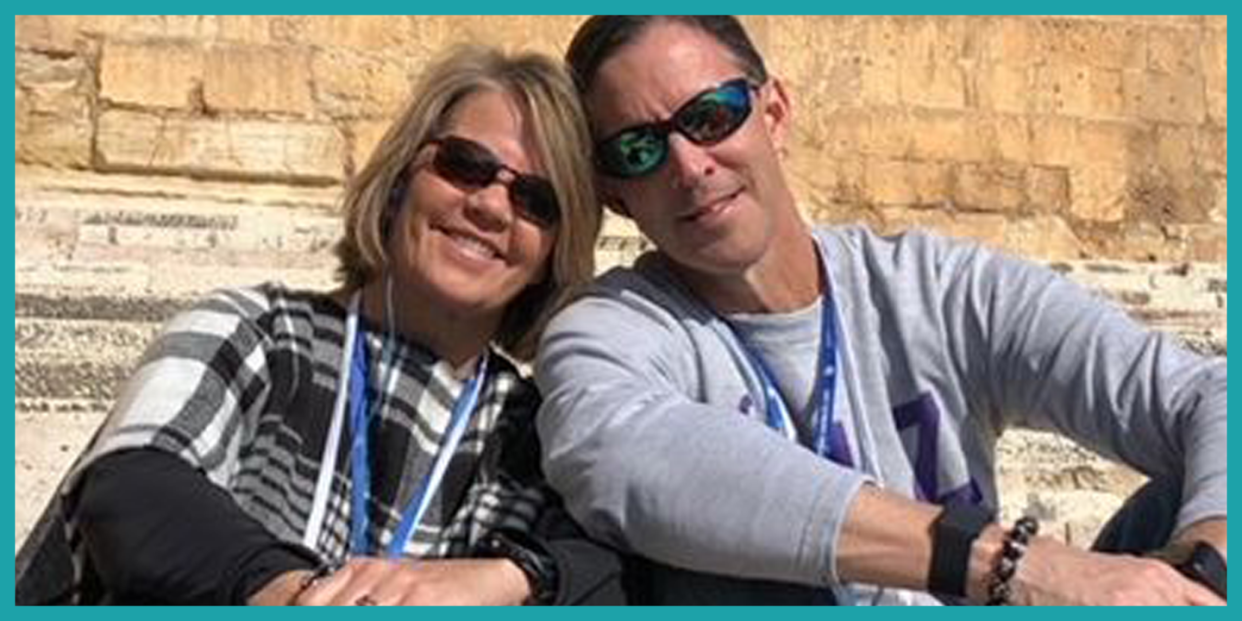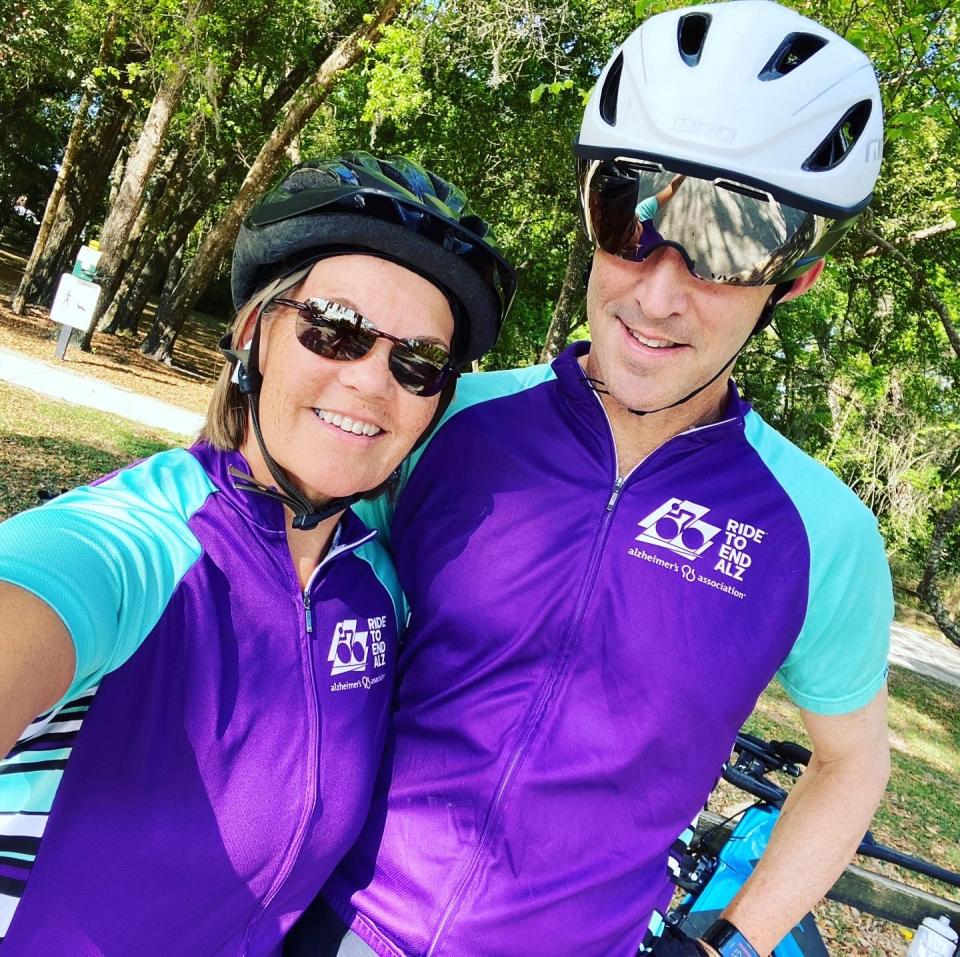‘I Was Diagnosed With Early-Onset Alzheimer’s After My Memory Started Failing Me at 54’

Alzheimer’s is generally considered a disease of old age—the risk of developing the degenerative brain condition rises exponentially for every decade over age 65. But in around 5% of all cases, the symptoms can begin much earlier, in what is known as early-onset (or young-onset) Alzheimer’s. In some cases, it may be due to genetics, but in the majority of those diagnosed with Alzheimer’s in their 30s, 40s, or 50s, there is no known cause. Here is one family’s story.
Julie: Dan and I have been married for 33 years—we were high school sweethearts. We have two amazing kids, who are 24 and 28, and our first grandbaby on the way. Dan has always had a short attention span, but I first started to notice something was different around three years ago, when he couldn’t remember things I had just told him. He would forget where he parked the car, even when it was in a really obvious spot, and one time we were at my parents’ house and we had to tear down a backyard shed, and he must have asked me six times what we were doing with the shed. It started getting really annoying! I had to stop and figure it out. Is he just not paying attention?
Dan: I didn’t notice anything was happening at first. I worked in the investment business, and there’s always so much information involved, that you really just have to condense things. I’ve never been much of a details person. I always tended to check out when someone was telling a long story. I say, Okay, what’s the bottom line?
Julie: Then in 2019, we took a family trip to Thailand, and I asked the kids to watch Dan and let me know if they noticed something was going on or if it was just me going crazy. At the end of the trip, they said to me, “Please take Dad to see a doctor.” He had just turned 54.
Dan: The first time something seemed wrong to me was when we got back from Thailand, and we were going to an event at a college that is just a couple of miles from our house. We had been there hundreds of time—I had watched games and coached and the kids did basketball camps there. But that day, I just couldn’t remember how to drive there. I call that my “Houston, we have a problem” moment.
Learn more about Dan and Julie’s story—and hear from top brain health experts—during our free webinar, Navigating a Diagnosis, on June 15.
Julie: So that was really the start of it. We went to our primary care doctor, and she did a little testing and said, “Just to be on the safe side, let’s get you in for an MRI.”
Dan: When the doctor tells you early on in the process that if you have a bucket list, you need to do it, and you need to prepare for the worst and hope for the best, you know the trajectory has changed. There was a long process of going through a lot of tests, and then on October 16, 2019, the doctor called and told me, “You have mild cognitive impairment consistent with Alzheimer’s disease, likely to lead to dementia.”
Julie: We knew nothing about the disease, only that it usually happens to really old people.
Dan: When the doctor told me, the first thing that came to my mind was the Ironman Kona. It’s a race that includes a 2.4-mile swim, followed by a 112-mile bike ride, followed by a marathon, all over the lava fields in Hawaii. It’s something I’ve always wanted to do. I’m not an elite athlete, so I didn’t think I’d ever be able to qualify until I’m 75 and no one else shows up in my age group! But I knew that based on my life expectancy with Alzheimer’s, I would probably be past my sell-by date by then. So I called and left a ton of messages at the Ironman Foundation, and they worked it out so I could compete. I’m doing that on October 9th this year.

Julie: The cool thing about the Ironman is that at first, he was just doing this to fight the disease. But he ended up getting on Instagram—he had never used social media before—and getting to know all these people who have a loved one who has been affected by the disease. He is dedicating each mile of the race to one of these people.
Dan: My goal is to get to the finish line and recite all the names and stories of all the people I’ve gotten to know from all over the world. I’ve heard some amazing human stories. It’s a terrible thing, but there is strength and beauty in the struggle.
I told my doctor when I first met him, there’s always an outlier—somebody’s going to be the first one to beat this disease, and it’s going to be me, and he can write a book about it. I’m taking the medication Aricept and a lot of vitamins and supplements, but the four main ways I’m fighting this disease are diet, exercise, brain engagement, and sleep. For exercise, I’m training every day for the Ironman. I also immediately adopted the Mediterranean diet, and I will never eat a hot dog or a pizza again. I eat mainly plant-based, with some salmon and red wine. For brain engagement, I do sudoku and the Spelling Bee every day, and I brush my teeth with my non-dominant hand. And then I try to get eight hours sleep every night, which makes me a little boring, but it’s really important to me. Eventually I think I may look into some clinical trials for new therapies, but I’m in great shape right now and I don’t want to take any risks. I’m not in that Hail Mary point yet.
Julie: Every now and then I’d love him to take a break from the Mediterranean diet and have a cookie with us, but you have to admire his total dedication! He really is a pitbull. The hardest thing for me, I think, was having to tell our parents. The kids saw it coming, because they knew about the testing he was going through, but telling our parents was brutal. They’re still all in a little bit of denial, because if you know Dan, it just doesn’t seem like it’s possible. For me, I would rather that he not have the diagnosis, of course. But at the same time, once he had the diagnosis, it became a lot easier to understand what was going on. I know this is not intentional, it’s not that he’s not paying attention to me.
Dan: At this point, most people can’t even tell what is going on with me, I still have a great vocabulary and mask things really well. And I do believe that all these lifestyle things that I’m doing, they may not prevent the dementia, but I know 100%, they will delay it. I’ve got a great thing going on here, and I want to keep it going. I want to come back tomorrow and hang out with Julie and my kids and go hiking and bike riding. I want to spend a lot of time with my new grandbaby and annoy the crap out of my son doing that! There’s so much money going into research right now, and time is technology in terms of medical advancements. They are looking at all these links between brain health, gut health, obesity, diabetes, and hypertension. They might all be related, so if you crack one, you crack several.
Julie: I think people have to hang on to the word hope.
Dan: I look at it like this: Every day is a gift. Every day I say, Thank you, God, for the gift of today, I am me, and my brain is working, and I am so grateful that I have a shot at tomorrow. I know that shot will end at some time, but it ends for everybody. So I’m just going to go through my life being as grateful as I can and trying to be as impactful as I can to other people and help this whole Alzheimer’s community.
You Might Also Like

